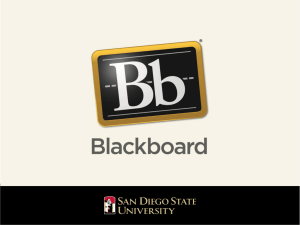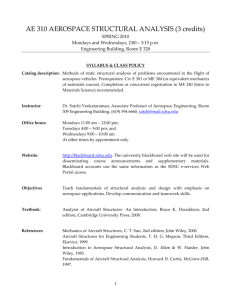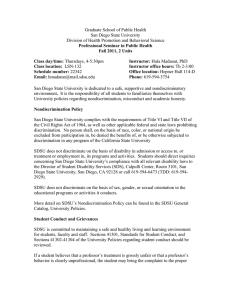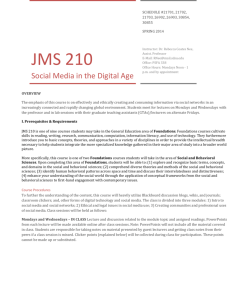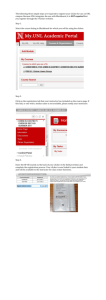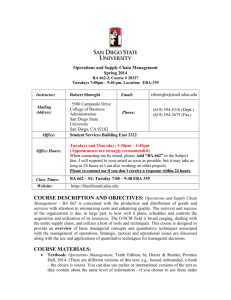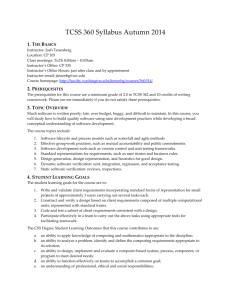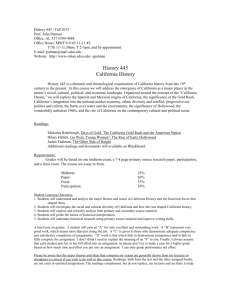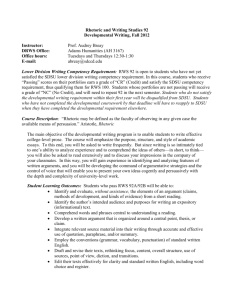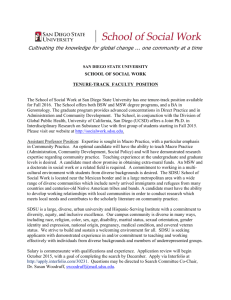View/Open - San Diego State University
advertisement
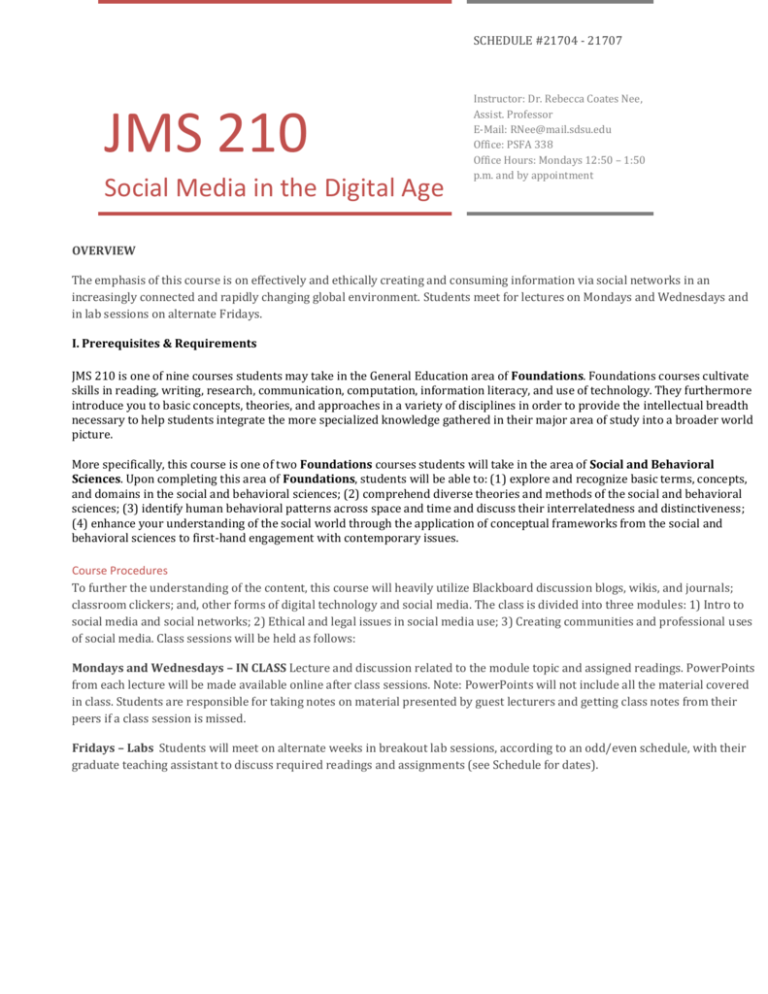
SCHEDULE #21704 - 21707 JMS 210 Social Media in the Digital Age Instructor: Dr. Rebecca Coates Nee, Assist. Professor E-Mail: RNee@mail.sdsu.edu Office: PSFA 338 Office Hours: Mondays 12:50 – 1:50 p.m. and by appointment OVERVIEW The emphasis of this course is on effectively and ethically creating and consuming information via social networks in an increasingly connected and rapidly changing global environment. Students meet for lectures on Mondays and Wednesdays and in lab sessions on alternate Fridays. I. Prerequisites & Requirements JMS 210 is one of nine courses students may take in the General Education area of Foundations. Foundations courses cultivate skills in reading, writing, research, communication, computation, information literacy, and use of technology. They furthermore introduce you to basic concepts, theories, and approaches in a variety of disciplines in order to provide the intellectual breadth necessary to help students integrate the more specialized knowledge gathered in their major area of study into a broader world picture. More specifically, this course is one of two Foundations courses students will take in the area of Social and Behavioral Sciences. Upon completing this area of Foundations, students will be able to: (1) explore and recognize basic terms, concepts, and domains in the social and behavioral sciences; (2) comprehend diverse theories and methods of the social and behavioral sciences; (3) identify human behavioral patterns across space and time and discuss their interrelatedness and distinctiveness; (4) enhance your understanding of the social world through the application of conceptual frameworks from the social and behavioral sciences to first-hand engagement with contemporary issues. Course Procedures To further the understanding of the content, this course will heavily utilize Blackboard discussion blogs, wikis, and journals; classroom clickers; and, other forms of digital technology and social media. The class is divided into three modules: 1) Intro to social media and social networks; 2) Ethical and legal issues in social media use; 3) Creating communities and professional uses of social media. Class sessions will be held as follows: Mondays and Wednesdays – IN CLASS Lecture and discussion related to the module topic and assigned readings. PowerPoints from each lecture will be made available online after class sessions. Note: PowerPoints will not include all the material covered in class. Students are responsible for taking notes on material presented by guest lecturers and getting class notes from their peers if a class session is missed. Fridays – Labs Students will meet on alternate weeks in breakout lab sessions, according to an odd/even schedule, with their graduate teaching assistant to discuss required readings and assignments (see Schedule for dates). Materials i>Clicker2: Clickers must be purchased at the SDSU bookstore. Readings Qualman, Eric (2013) Socialnomics: How social media transforms the way we live and do business. Second edition. Students are responsible for keeping up with social media news by following Mashable’s social media news and PBS MediaShift, Social Media. A Twitter list useful for social media resources, news, and tips will be constructed as a section assignment. Additional readings will be assigned and posted in the Blackboard lecture course for each module. Videos The Social Network (watch by 9/4). (On reserve at SDSU library or available through Netflix and Amazon.) Blackboard Each student should have access to two Blackboard portals related to JMS 210: the LECTURE portal and the LAB portal (if you do not have both sections, notify your teaching assistant). Lecture: This portal is used to register and record your clicker scores and exam scores. Module material and readings also will be posted as well as the overall syllabus, schedule and general announcements. Lab: This portal is used by your Graduate Teaching Assistant to record your lab participation grades and grades on your assignments. Many assignments will be turned in through this portal (see the schedule for details). At the end of the semester, your GTA will import your lecture grade to tally and post your final grade. Learning Objectives The goal of this course is to prepare students to become more effective global citizens by understanding social media networks and using them to communicate in an ethically responsible manner. Students will be asked to: Become participatory, responsible citizens by identifying the most effective ways to create and consume information on social network sites Think critically about the practical and theoretical implications of emerging media technologies on all sectors of life on local, regional and international scales Move beyond their geographic and cultural comfort zones to engage cross culturally with others globally through online communities Utilize digital and social media to become fluent in the practices, ethics and conventions of these spheres Analyze the effectiveness of the social media presence of celebrities, corporations, news media, politicians and other prominent figures. Learning Outcomes After successfully completing this course, students should be able to: Create appropriate media content (written, verbal, visual, audio, etc.), for specific audiences on a variety of social network platforms Evaluate mediated discourse within a variety of contexts and analyze how the contextual boundaries are changing in the digital age Identify characteristics of virtual audiences or communities in online environments Understand the history of social network formations and explain the impact of newer media technologies on societal norms and practices. Participation and Grading Attendance and participation are required in the face-to-face lecture sessions twice a week and in breakout sections on alternate Fridays. Students will receive points for their clicker responses to questions asked during lectures. These points cannot be made up for any reason (including technical issues, forgetting the clicker, and illness). Students are expected to bring their clickers and extra batteries to every class and report clicker failures to the SDSU Bookstore immediately. In addition to participation, students will be assessed both on their individual progress in the class and a group project. Individually, students are graded on three exams: two midterms and a final exam. Group collaboration is another important component of this class. Small groups of students will form within each section for the purpose of creating a social media case study wiki or video. The case study will be presented in face-to-face lab section meetings. Exam Policy Exams must be taken on the date and time shown in the syllabus. Exams cannot be taken earlier or later. If a student misses a midterm for a school-related event or illness, documentation MUST be provided to the instructor prior to the exam for a planned event and the next class meeting after the exam for an emergency illness. In this case, the student’s final exam will be weighted to include the missed exam. Students failing to comply with this policy will not be allowed to make up the points. The final MUST be taken at the time stated. Students will not be allowed into an exam after the first student completes the exam and leaves the building. For more information on SDSU final exam policies, please see the Office of the Registrar final exam schedule: http://arweb.sdsu.edu/es/registrar/finalexams/13_spring.html Social Media Policy This is a class about social media, therefore social media use is encouraged in an appropriate manner related to the class. Students should not use social media to complain about the class, people in the class, assignments, or other inappropriate ways. As we will discuss in this class, the use of social media is a reflection of the user. The hashtag for the class on Twitter is #JMS210. Please be aware that the instructor follows this hashtag regularly and may show tweets using the class hashtag during lecture. What should students share with the #JMS210 hashtag? News about social media! Students are welcome to follow the instructor on Twitter (@rcnee) and may be followed back, if they have a public account. The instructor has a personal Facebook account but prefers to accept friendship offers from students after they have graduated. Policy regarding incompletes: The instructor will strictly adhere to the University policy regarding the authorization of an Incomplete grade: I (incomplete authorized) indicates that a portion of required coursework has not been completed and evaluated in the prescribed time period due to unforeseen, but fully justified, reasons and that there is still a possibility of earning credit. It is your responsibility to bring pertinent information to the instructor and to reach agreement on the means by which the remaining course requirements will be satisfied. -SDSU Catalog, Part Six, p. 462 The chart below shows how points are assigned for grades: Note: A detailed schedule with links to required readings and description of all the course assignments are attached to the end of this document. All section activities and the social media analysis will be completed in the lab section course on Blackboard. Assignment/Assessment Point Value/Percentage LAB SECTION GRADES: Lab section in class quizzes and participation activities (6 classes, 5 pts each) 30 (3%) Peer evaluation 1 - paper 20 (2%) Peer evaluation 2 - paper 30 (3%) Group case study - wiki 40 (4%) Social media analysis (3 blog posts x 10) 30 (3%) Lab Total 150 (15%) LECTURE GRADES Clicker score 50 ( 5%) 64 clicker points will be available Module 1 exam 260 (26%) Module 2 exam 260 (26%) Final examination (comprehensive) 280 (28%) Lecture Total 850 (85%) Total Possible 1000 (100%) Point-to-Grade Conversion 930-1000 A 900-929 A- 870-899 B+ 830-869 B 800-829 B- 770-799 C+ 730-769 C 700-729 C- 670-699 D+ 630-669 D 600-629 D- 0-599 F What an A looks like for this course: To earn an A in this class a student must – o o o o Participate in class and online discussions consistently and on time Show, through written assignments and discussion board postings, a good grasp of social media and other digital skills covered in class Work collaboratively within groups on projects, including the case study Demonstrate superior knowledge of course content through strong performance on exams Plagiarism Plagiarism is a serious offense. Students will immediately be reported to the Center for Student Rights & Responsibilities if the instructor suspects any type of plagiarism, whether on a formal assignment or in a discussion board post. From the SDSU Library (http://infotutor.sdsu.edu/plagiarism/what.cfm?p=graphic): “Plagiarism is the act of using someone else's words, sentences, or ideas and passing them off as your own without giving credit by citing the original source.” DISCUSSION BOARD posts must not be plagiarized. You might be plagiarizing if you: Submit someone else's work as your own. Buy a paper from a papermill, website or other source. Copy sentences, phrases, paragraphs, or ideas from someone else's work, published or unpublished, without giving the original author credit. Replace select words from a passage without giving the original author credit. Copy any type of multimedia (graphics, audio, video, internet streams), computer programs, music compositions, graphs, or charts from someone else's work without giving the original author credit. Piece together phrases, ideas, and sentences from a variety of sources to write an essay. Build on someone else's idea or phrase to write your paper without giving the original author credit. Submit your own paper in more than one course. San Diego State University regards plagiarism as academic dishonesty. Consequences of plagiarism may include failing an assignment, receiving a lower course grade, and even failing a course. Read SDSU’s policy on Academic Dishonesty: http://www.sa.sdsu.edu/srr/academics1.html Students with Disabilities Students who need accommodation of their disabilities should contact me privately in person, to discuss specific accommodations for which they have received authorization. If you need accommodation due to a disability, but have not registered with Student Disability Services at 619594-6473 (Calpulli Center, Suite 3101), please do so before making an appointment to see me. One point will be deducted for every grammar, spelling or punctuation error.
